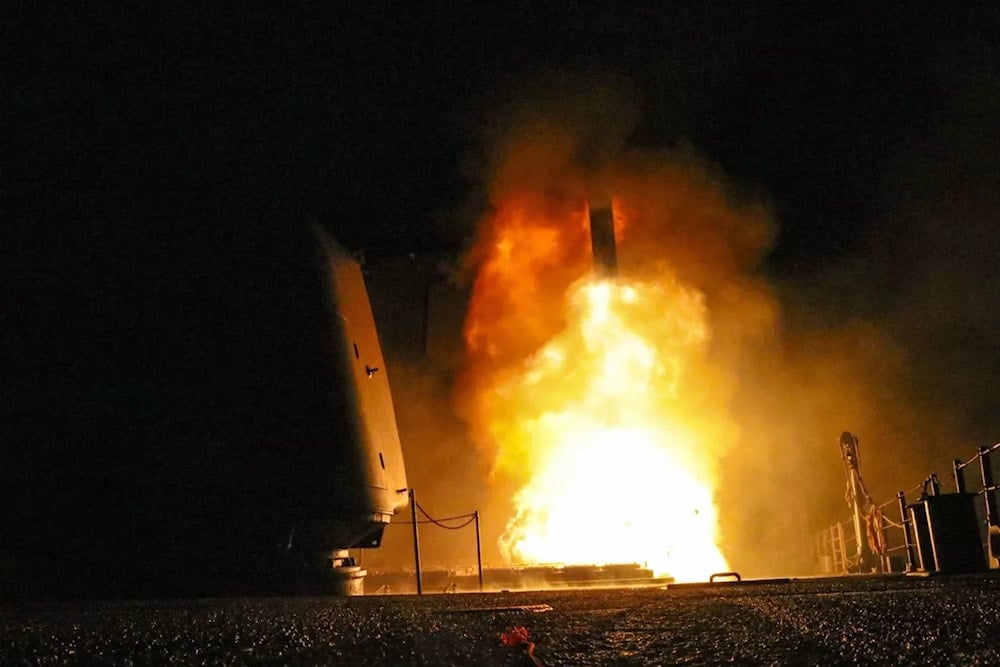US to deploy ground-based missiles in Indo-Pacific in 2024: Reports
The United States has potential plans to deploy land-based versions of the Tomahawk cruise missile and the Standard missile-6 in the Indo-Pacific region in 2024.
-

In this image provided by the US Navy, the guided-missile cruiser USS Monterey (CG 61) fires a Tomahawk land attack missile on April 1, 2018. (AP)
The US military has plans to deploy ground-based intermediate-range missiles in the Indo-Pacific region in 2024 in an effort to deter China, Nikkei Asia reported on Sunday, citing US Army Pacific spokesperson Rob Philips.
The newspaper reported that the United States has potential plans to deploy land-based versions of the Tomahawk cruise missile and the Standard missile-6 (SM-6) with an estimated range of 500 kilometers (310.6 miles) to 2,700 kilometers, adding that the expected location and timing was not specified.
It is worth highlighting that this is the US' first arsenal in the region since the end of the Cold War and the first deployment of intermediate-range missiles by the United States since the country withdrew from the Intermediate-Range Nuclear Forces Treaty (the INF Treaty).
Back in 2019, former US President Donald Trump withdrew from the INF treaty, signed between the Soviet Union and the US in 198, which banned the countries from developing and possessing ballistic and cruise missiles.
Read next: US building military radar on Palau pacific island to monitor China
Increasing NATO activity in Indo-Pacific
On a similar note, earlier this year, German Defense Minister Boris Pistorius said on June 4 that in 2024, Germany would be sending two warships to the Indo-Pacific. The reason is the necessity to safeguard the so-called "rules-based international order," he said.
This comes in light of increased NATO activity in the region since the US labeled China a security challenge a year ago.
"The German Federal Government sent a frigate to the Indo-Pacific in 2021 and will again, in 2024, deploy maritime assets — this time a frigate and a supply ship — to the region," Pistorius said in Singapore while emphasizing that the deployment of the ships is not intended to target any nation and is solely meant to protect sea lines of communication.
The 2021 deployment was in response to tensions in the Korean peninsula, he noted.
"These deployments — I want to make this very clear — are not directed against any nation," he said, adding that Berlin is committed to safeguarding peace and security in the Indo-Pacific and plans to strengthen its influence and alliances in the region in the years to follow.
Read next: China warns against 'NATO-like' alliances in Asia-Pacific
Austin: Countering China's authoritarian preferences
Last year, Pentagon chief Lloyd Austin stressed that the United States will stand in the way of China's alleged Indo-Pacific regional change strategies.
According to Austin, "the only country with both the will and, increasingly, the power to reshape its region and the international order," China seeks to "suit its authoritarian preferences."
In that regard, the US Department of Defense Secretary clearly said at the Reagan National Defense Forum, "We will not let that happen.”
The Pentagon chief added that "we stand in a decisive decade in Europe as well as in Asia" given that "the next few years will set the terms of our competition with the People’s Republic of China," explaining that "they will shape the future of security in Europe."

 3 Min Read
3 Min Read








